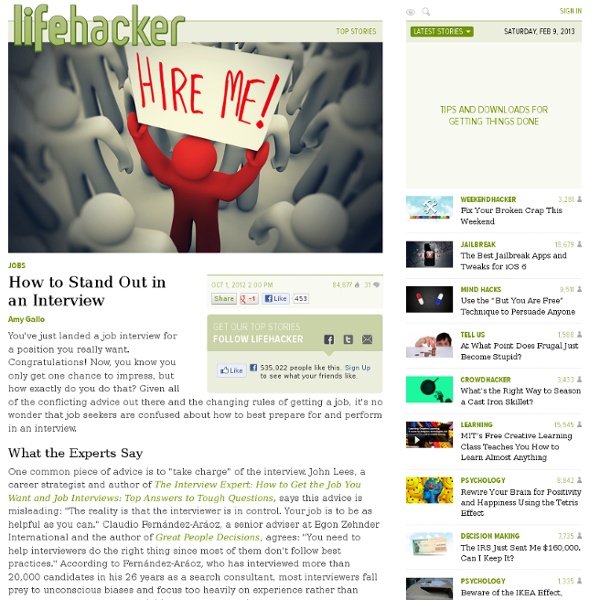The Interview Question You Should Always Expect - John Lees
by John Lees | 11:26 AM November 4, 2011 Whether you are a new middle manager or a new President-elect, the common wisdom is that you have three months to make an impact in your new role. And yet when preparing for job interviews, candidates make the mistake of believing that most questions will be about their past experience, not what they plan to do once hired. New hires have to impress their bosses, peers, and employees in less time than it takes some of us to arrange a meeting. First, approach this question — and indeed, every interview question — as an audition. Second, beware of extremes. At the other end of the spectrum is the candidate who tells the organisation every mistake it’s making and offers to give things a pretty big shake-up — usually enough to put the interviewers’ backs up. The best answers take a middle ground, effectively saying, “Yes, I will learn and listen, but I will also get on with things.” Finally, think about your presentation. Analysis.
The Interview Expert: How to get the job you want: John Lees: 9780273762553: Amazon.com
How to Create More Margin in Your Life
The last five weeks have been incredibly busy for me. My new book, Platform, launched on May 22. My daughter Madeline got married the next weekend. Photo courtesy of ©iStockphoto.com/toshimself Since then, I have done seventy-three radio, podcast, magazine, and newspaper interviews. To be honest, it has been overwhelming, especially because I am committed to keeping up with my blog and podcasting. I realized that if I didn’t take action now and regain control of my calendar, the train was going to come off the tracks. So, I went back and reviewed my Ideal Week (see image below). I didn’t worry about how I was going to make it happen; I first needed clarity about what I wanted my calendar to look like. In a word, I needed margin. In his excellent book, Margin: Restoring Emotional, Physical, Financial, and Time Reserves to Overloaded Lives, Richard Swenson, M.D. describes margin like this: Margin is the space between our load and our limits. Margin is not something that just happens.
Le bilan de compétences : une fenêtre d’opportunité pour rebondir
Réorientation professionnelle, opportunité de changement, réinsertion professionnelle… voici les expressions qui viennent à l’esprit quand on évoque le bilan de compétence. Mais, avant tout, le bilan de compétences est une démarche personnelle. Droit, devoir, démarches, découvrez un dispositif complet d’accompagnement de votre carrière. Brève définition du Bilan de compétences Le Bilan de compétences est un droit accessible à tous (*). Ce droit est représenté par un dispositif d’accompagnement accessible à toutes les personnes, salariés ou non, souhaitant consacrer du temps pour elles-mêmes dans le but de mieux identifier leurs atouts pour les mettre au service d’un nouveau projet, personnel, professionnel ou mixte. Un outil ajusté aux besoins des personnes L’objectif est d’identifier et de valoriser les compétences liées au parcours professionnel et aussi afin de découvrir les talents inhérents à chaque personne. Des recommandations propres à chaque individu



